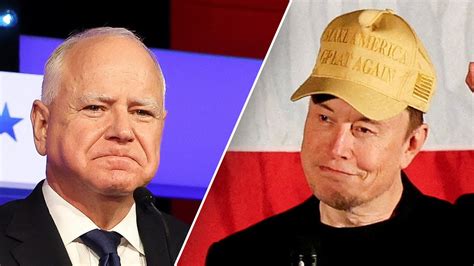
Minnesota Governor Tim Walz offered a blunt farewell to Elon Musk and his company X, formerly known as Twitter, stating, “Good riddance. Thanks for the subsidies!” after the company significantly reduced its content moderation efforts and laid off staff in the state, raising concerns about misinformation and platform safety during the upcoming election.
Governor Walz’s terse response came after X eliminated most of its election integrity team and scaled back its presence in Minnesota. The governor’s office confirmed the sentiment, highlighting that the state had provided subsidies to the company. His sentiment reflects growing concerns about the platform’s role in spreading misinformation and its potential impact on democratic processes. The decision by X to dismantle its election integrity efforts has drawn sharp criticism from lawmakers and advocacy groups, who worry about the proliferation of false narratives and the erosion of trust in election outcomes. Walz’s statement encapsulates the frustration and disappointment felt by many who believe X is shirking its responsibility to safeguard the integrity of online discourse.
The backdrop of this exchange is the ongoing debate surrounding the role of social media platforms in shaping public opinion and influencing electoral outcomes. Critics argue that platforms like X have a moral and civic duty to combat misinformation and protect the democratic process. On the other hand, proponents of free speech argue that platforms should not censor or restrict content, even if it is false or misleading. This tension lies at the heart of the debate over content moderation and the responsibility of social media companies.
The subsidies that Walz mentioned refer to financial incentives offered by the state of Minnesota to attract and retain businesses. These incentives can take the form of tax breaks, grants, or other forms of financial assistance. The goal of these subsidies is to stimulate economic growth and create jobs. However, some critics argue that subsidies are a waste of taxpayer money and that they can distort the market by giving an unfair advantage to certain companies. The case of X raises questions about the conditions that should be attached to these subsidies and whether companies should be held accountable for their social impact.
This situation underscores a larger trend of tech companies facing increased scrutiny from policymakers and the public regarding their role in society. The debate over content moderation, misinformation, and the responsibilities of social media platforms is likely to continue in the years to come. Walz’s statement serves as a reminder that states are willing to hold these companies accountable for their actions and to demand that they contribute to the public good.
Background on X’s Content Moderation Changes
Since Elon Musk acquired Twitter in October 2022 and rebranded it as X, the platform has undergone significant changes in its content moderation policies. Musk, a self-described “free speech absolutist,” has stated his belief that Twitter should allow a wider range of expression, even if it is offensive or controversial. As a result, X has relaxed its restrictions on certain types of content, including hate speech and misinformation.
These changes have been met with mixed reactions. Some users have welcomed the increased freedom of expression, while others have expressed concerns about the potential for the platform to become a haven for hate speech and disinformation. Several studies have indicated a rise in hate speech and misinformation on X since Musk’s acquisition.
The decision to eliminate most of the election integrity team at X has raised particular concerns about the platform’s preparedness for the upcoming elections. This team was responsible for identifying and removing false or misleading information about elections, as well as for working with election officials to address any potential threats to the electoral process. The dismantling of this team has led to fears that X will be unable to effectively combat misinformation during the elections, which could have a negative impact on voter turnout and the integrity of the results.
Minnesota’s Investment and Expectations
Minnesota, like many other states, has actively courted tech companies with the promise of financial incentives and a skilled workforce. The state’s investment in companies like X was based on the expectation that these companies would contribute to the local economy and uphold certain standards of corporate responsibility. Walz’s statement suggests that the state feels X has failed to meet these expectations.
The specific details of the subsidies provided to X by the state of Minnesota have not been publicly disclosed. However, it is common for states to offer a range of incentives to attract businesses, including tax credits, grants, and infrastructure improvements. These incentives are typically tied to specific commitments from the company, such as job creation or capital investment.
The decision by X to reduce its presence in Minnesota and scale back its content moderation efforts has raised questions about whether the company has violated the terms of its agreement with the state. It is possible that the state could seek to claw back some of the subsidies it provided to X if it determines that the company has failed to meet its obligations.
The Broader Context of Social Media Regulation
The situation in Minnesota is part of a broader trend of increased scrutiny of social media platforms by policymakers and the public. Concerns about the spread of misinformation, the impact of social media on mental health, and the potential for these platforms to be used for malicious purposes have led to calls for greater regulation.
In the United States, there has been growing support for reforms to Section 230 of the Communications Decency Act, which protects social media platforms from liability for content posted by their users. Some lawmakers argue that this protection should be narrowed to hold platforms accountable for the spread of illegal or harmful content.
The European Union has taken a more aggressive approach to regulating social media platforms. The Digital Services Act (DSA), which came into effect in 2024, imposes a range of obligations on platforms, including requirements to remove illegal content, combat disinformation, and protect users’ fundamental rights.
The debate over social media regulation is likely to continue in the years to come. There is no easy answer to the question of how to balance the need to protect free speech with the need to address the harms associated with social media platforms. However, it is clear that policymakers are increasingly willing to consider regulatory interventions to address these issues.
Impact on Minnesota and the Upcoming Elections
The departure of X’s content moderation team from Minnesota raises specific concerns about the platform’s ability to safeguard the integrity of the upcoming elections in the state. Minnesota has a history of close elections, and even small amounts of misinformation could have a significant impact on the outcome.
The state’s election officials have expressed concern about the potential for X to be used to spread false or misleading information about voting procedures, candidate qualifications, or election results. They have urged X to take steps to address these concerns and to work with them to ensure that the elections are fair and accurate.
The loss of jobs in Minnesota due to X’s scaling back of operations is also a concern for the state’s economy. While the number of jobs lost is relatively small, it represents a setback for the state’s efforts to attract and retain tech companies. Walz’s statement reflects the state’s disappointment with X’s decision and its determination to hold the company accountable for its actions.
Future Implications
Governor Walz’s forceful response to X’s actions could have several implications for the future of the relationship between states and social media companies. It sends a clear message that states are willing to hold these companies accountable for their social impact and to demand that they contribute to the public good. It also underscores the importance of including social responsibility clauses in agreements with companies that receive state subsidies.
Other states may follow Minnesota’s lead and adopt a more assertive approach to regulating social media platforms. This could lead to a patchwork of state laws and regulations, which could create challenges for companies that operate across state lines.
The situation in Minnesota also highlights the need for a national framework for regulating social media platforms. A national law could provide clarity and consistency for companies and ensure that all Americans are protected from the harms associated with social media.
The episode serves as a case study of the evolving relationship between state governments and tech giants. As these companies wield increasing power and influence, states are grappling with how to balance the benefits of attracting tech investment with the need to protect the public interest.
Detailed Breakdown of the Situation
The statement from Governor Walz is layered with implications. “Good riddance” signals a lack of regret or concern over X’s reduced presence in Minnesota. This indicates a belief that the potential downsides of X’s operations, particularly concerning misinformation and election integrity, outweigh the economic benefits.
The phrase “Thanks for the subsidies!” is particularly pointed. It suggests that Minnesota feels it made a bad investment by providing financial incentives to a company that is now perceived as contributing to societal problems. This could lead to a reassessment of the state’s approach to attracting businesses and a greater emphasis on ensuring that companies align with Minnesota’s values.
The loss of the election integrity team at X is a major concern because it leaves the platform vulnerable to manipulation and disinformation campaigns. These campaigns could target voters with false or misleading information about candidates, voting procedures, or election results. This could depress voter turnout, confuse voters, or even incite violence.
The absence of a robust content moderation system also creates an environment where hate speech and harassment can flourish. This can make the platform unsafe for users and discourage participation in online discourse. It can also damage the reputation of the platform and make it less attractive to advertisers.
The broader implications of this situation are that it highlights the growing tension between free speech and the need to protect democratic processes. While free speech is a fundamental right, it is not absolute. There are limits to free speech, such as incitement to violence and defamation. The question is how to strike the right balance between protecting free speech and preventing the spread of harmful content.
Content Moderation and Algorithmic Amplification
Content moderation on social media platforms involves a complex interplay of human reviewers and automated systems. Human reviewers assess content flagged for potential violations of platform policies, making decisions on whether to remove, label, or otherwise address the content. Automated systems, often powered by artificial intelligence (AI), assist in identifying potentially problematic content at scale.
However, these automated systems can also contribute to the problem of misinformation. Algorithmic amplification refers to the tendency of algorithms to prioritize content that is likely to generate engagement, regardless of its accuracy or veracity. This can lead to the rapid spread of false or misleading information, particularly if it is emotionally charged or sensational.
Social media platforms have a responsibility to address the problem of algorithmic amplification. This could involve modifying algorithms to prioritize accurate information, demoting false or misleading content, or providing users with tools to assess the credibility of information.
The Role of Government and Regulation
The role of government in regulating social media platforms is a subject of intense debate. Some argue that government regulation is necessary to protect consumers, prevent the spread of misinformation, and safeguard democratic processes. Others argue that government regulation could stifle innovation and infringe on free speech rights.
There are a variety of regulatory approaches that governments could take. These include requiring platforms to remove illegal content, mandating transparency about content moderation policies, and imposing liability for the spread of harmful content.
Any government regulation of social media platforms must be carefully designed to balance the competing interests of free speech, innovation, and public safety. It is important to avoid measures that could chill legitimate expression or unduly burden platforms.
The Importance of Media Literacy
In addition to content moderation and regulation, media literacy plays a crucial role in combating misinformation. Media literacy refers to the ability to access, analyze, evaluate, and create media. It involves understanding how media messages are constructed, how they can be used to persuade or manipulate audiences, and how to critically evaluate the information presented in media.
Individuals with strong media literacy skills are better equipped to identify false or misleading information, to assess the credibility of sources, and to make informed decisions about the information they consume.
Schools, libraries, and community organizations can play a role in promoting media literacy. Social media platforms can also contribute by providing users with tools and resources to assess the credibility of information.
X’s Response and Future Plans
As of the time of this rewriting, X has not issued a direct response to Governor Walz’s statement. However, the company has generally defended its content moderation policies by arguing that it is committed to protecting free speech while also addressing illegal content.
It is unclear what X’s future plans are for content moderation and election integrity. The company has stated that it is committed to working with election officials to ensure the integrity of elections, but it has not provided details about how it will do so.
It remains to be seen whether X will reverse its decision to eliminate most of its election integrity team or whether it will adopt a more proactive approach to combating misinformation. The company’s actions in the coming months will be closely watched by policymakers, advocacy groups, and the public.
Frequently Asked Questions (FAQ)
1. What was Governor Walz’s response to X (formerly Twitter) reducing its content moderation efforts in Minnesota?
Governor Walz’s response was, “Good riddance. Thanks for the subsidies!” This statement expressed his dissatisfaction with X’s decision to scale back its operations in Minnesota, particularly its content moderation efforts and the elimination of most of its election integrity team.
2. Why is Governor Walz upset with X?
Governor Walz is upset because X has reduced its content moderation efforts, including dismantling its election integrity team, raising concerns about the spread of misinformation and the potential impact on elections. Additionally, the state had provided subsidies to X, and Walz’s statement implies that the company has not lived up to its expected responsibilities in return.
3. What are content moderation efforts, and why are they important?
Content moderation efforts refer to the processes and policies implemented by social media platforms to monitor and regulate user-generated content. These efforts aim to remove or address content that violates platform policies, such as hate speech, misinformation, and incitement to violence. They are important for maintaining a safe and informative online environment, protecting users from harm, and safeguarding democratic processes.
4. What impact could X’s reduced content moderation have on the upcoming elections?
The reduced content moderation could lead to the proliferation of false or misleading information about elections, which could confuse voters, suppress turnout, or even incite violence. The absence of a dedicated election integrity team makes the platform more vulnerable to manipulation and disinformation campaigns.
5. What are the potential consequences of Minnesota’s disappointment with X?
Potential consequences include a reassessment of the state’s approach to attracting businesses, a greater emphasis on ensuring that companies align with Minnesota’s values, and the possibility of clawing back some of the subsidies provided to X if the company is found to have violated the terms of its agreement with the state. It also sets a precedent for other states to hold social media companies accountable for their social impact.









